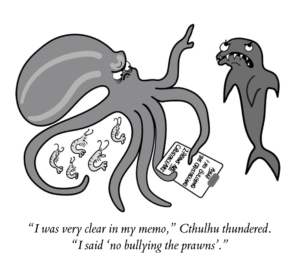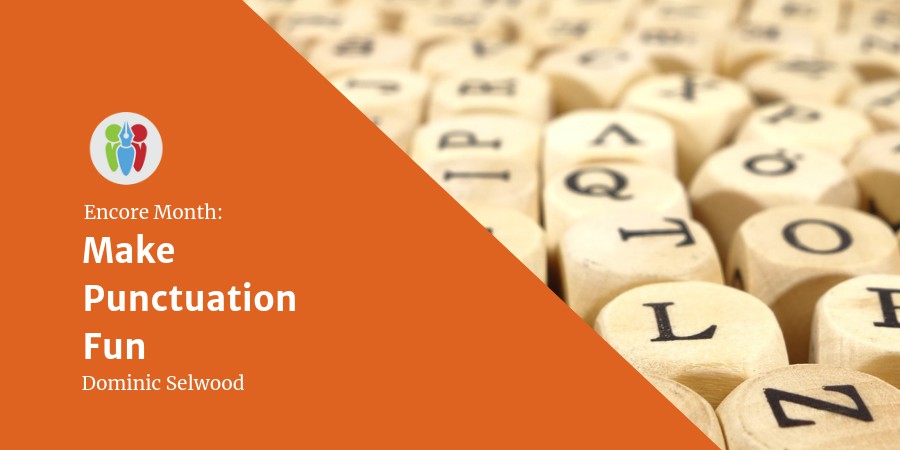Punctuation tends to produce strong reactions. Either you love it or you hate it. But one thing is certain as writers, we all need it. In today's encore post, Dominic Selwood, author member, delights in punctuation so much so that he's taken the time to write a guide to punctuation for the 21st century writer. Today he tells us why – and also helps us learn to stop worrying and love punctuation! You can make punctuation fun too. (In the interests of objectivity, we should state that other punctuation guides are available.)
Do you you find checking punctuation a chore rather than a pleasure? Are you wary of horror stories of readers leaving 1* reviews when they spot a misplaced apostrophe? Don't worry, you're in good company – even Shakespeare was no great shakes at punctuation.

Dominic Selwood, author, journalist, barrister – and evangelist for punctuation
Why did you decide to write a book like this?
Punctuation Without Tears started as a slim — and hopefully funny — guide for my teenage children. I showed it to some friends, and then realized that quite a few adults want a quick guide to punctuation: for work, for a writing project, or just generally to brush up. A number of schools have already put the book on their curriculum, and indie writer specialists like J F Penn have recommended it to their writing communities as a helpful guide. I don’t have a PhD in punctuation (you’ll be relieved to know!) but, as a journalist, author, and barrister, I’ve spent my career writing, and I’m a true believer that getting on top of punctuation is one of the best things you can do for yourself as a writer.
Why does punctuation cause authors so much anxiety?
Nobody becomes an author because punctuation speaks to them so much they want to spend their life admiring colons.
Most authors just want to tell stories or communicate facts or opinions. You can bet Shakespeare wasn’t thinking about the glories of the apostrophe when plotting Romeo and Juliet (and actually, by modern standards, Shakespeare’s original punctuation was all over the place). Punctuation is something authors just have to use, like a painter has to engage with the physicality of brushes and canvases. This is where punctuation anxiety comes in, because it’s often an afterthought, and writers frequently have traumatic memories of English lessons at school.
The good news is that it’s totally possible to punctuate magnificently without needing to learn a whole load of complex grammar rules.
Is it ever too late to learn punctuation rules? Is there such a thing as punctuation dyslexia where people just have a mental block about it?
It’s absolutely never too late. Getting to grips with punctuation is actually very simple. (You can read Punctuation Without Tears in an hour and know everything you need to know!)
My main tip is that if you’re confused about punctuation, wipe your memory banks, read my book, and you’ll be an expert punctuator. It’s not like learning a foreign language. There are just a few simple rules..
I sincerely believe that punctuation is easy and everyone can master it!
How did you learn punctuation at school, and did it help or hinder?
 I was made to learn and recite long lists of grammar rules, which was skull-numbingly dull. Most of it is also largely useless now, as writing has changed so much since then. The thing those lessons really taught me was what a room of 24 bored people looked like. Hopefully Punctuation Without Tears makes it slightly more bearable, and even a bit fun! That was one of the reasons for asking artist Delia Johnson to illustrate the books, as humorous pictures can really help make examples more memorable. She’s done an amazing job. I am especially fond of Cthulhu remonstrating with a shark bullying a phalanx of prawns.
I was made to learn and recite long lists of grammar rules, which was skull-numbingly dull. Most of it is also largely useless now, as writing has changed so much since then. The thing those lessons really taught me was what a room of 24 bored people looked like. Hopefully Punctuation Without Tears makes it slightly more bearable, and even a bit fun! That was one of the reasons for asking artist Delia Johnson to illustrate the books, as humorous pictures can really help make examples more memorable. She’s done an amazing job. I am especially fond of Cthulhu remonstrating with a shark bullying a phalanx of prawns.
In your career as a journalist, did you have to relearn it to suit house styles and were your personal preferences overruled?
Not really. I’m very happy to go with different house styles. I have my personal preferences (like -ize and the Oxford comma — more on these later), but punctuation is just a tool, and it’s good to be flexible. If there’s a genuine uncertainty, most editors I’ve been lucky enough to work with are usually happy to brew up a cup of tea and sit down to chat it through.
METHOD
You advocate a certain amount of relaxation of the standard rules – unlike e e cummings who went right off piste. How far can one do that without distracting the reader from the message in the text, and is that too dangerous a game to risk playing?
e e cummings was into some quite niche and extreme experimentation. He had no intention of being mainstream, and was screaming to the world, ‘Look at me! I’m an artist!’ There’s nothing wrong with that, and his writing certainly brightened up English lessons for me at school.
However, for most of us, if you’re trying to tell a story or create a piece of factual writing, you want the punctuation to do its job invisibly, giving your writing shape and momentum behind the scenes.
It should never take the limelight — unless you are trying to be like e e cummings. Punctuation needs to make everything happen while staying discreetly unobtrusive. Like Jeeves.
Given that schools are more liberal these days with spelling at an early age, giving priority to fluency before homing in on accuracy, do you think the same should happen with punctuation?
A hundred per cent. Writing is about ideas. If you mark a young child’s story and give it back with corrections all over it because you didn’t like their punctuation, you’re probably putting the child off writing. That’s a tragedy, and totally avoidable. The technicalities of good punctuation can come later.
INDIVIDUAL PUNCTUATION MARKS
What punctuation error do you think people should be less judgmental/harsh about?
I am quite baffled that some people retain a rigid insistence that you should never write ‘can’t’, ‘won’t’, ‘I’ll’, ‘you’ve’, ‘we’ll’, and other abbreviations. They want you to write the words out in full, like 50 years ago: ‘cannot’, ‘will not’, ‘I will’, ‘you have’, ‘we will’, etc. It was once a rule, but it simply isn’t any more.
Nowadays there’s a vast difference between formal and informal writing.
If you’re writing a novel or a blog (like this), then it’s totally fine to use abbreviations because it’s how we all speak. You probably want to stick to the formal approach for business or technical writing, but it sounds very stilted in more relaxed modern contexts.
Should the semi-colon become punctuation's equivalent to the dodo?
No! Kurt Vonnegut told his writing classes it was a hermaphrodite representing absolutely nothing except that you went to college. And George Orwell famously declared that he wrote Coming Up for Air without a single semicolon (in fact, he used three). But they’re both missing the point.
If you look inside a carpenter’s toolbox, you’ll see all sorts of bizarre tools. Some probably don’t get used very often. But each one exists because it does something better than the other tools. The semicolon is exactly the same. There are things that only it can do.
We actually have very few punctuation marks with which to shape our writing, so why would we throw one of them away? The semicolon is a beautiful punctuation mark, and we should all be militant about keeping it.
The Oxford comma – discuss! What is it and why does it matter, if indeed it does matter?
Ah — the Oxford comma! How on earth did such a simple idea become so controversial?
Well, the main reason is that for decades school teachers marked it as wrong.
For those who want a quick reminder, the Oxford comma is when you put a comma before the third item in a list. For example, ‘The books that made Snow White happiest were: Ant and Bee, The Tale of Mrs Tiggy-Winkle, and The Necronomicon’. It’s actually not just an Oxford quirk; it’s also called the Harvard comma, the series comma, or the serial comma, and it’s definitely not wrong. Many house styles use it, and everyone should feel free to add the comma if they want to. It’s down to personal taste. That said, there are times when it’s crucial. If you look at this sentence, it could have two quite different meanings. ‘Drago gave the chocolate crucifixes to his brothers, Vlad and Wadim’. An Oxford comma clears it up perfectly: ‘Drago gave the chocolate crucifixes to his brothers, Vlad, and Wadim’.
If you could introduce one new punctuation mark, what would it be and how would you use it?
I’m a huge fan of the interrobang (‽). I am endlessly using ‘?!’ in e-mails and texts, and I love the idea of combining them into one. I’m all for it. In the early days of printing there were many punctuation marks we’ve now dropped. Punctuation evolves. I’m all in favour of people popularizing new ones!
Are there any archaic punctuation marks you'd like to revive? Or any punctuation mark that you think should be more widely used?
Absolutely. I love the Tironian Et. It looks like a ‘7’ with a bar through it, and it’s an abbreviation for ‘and’, just like an ampersand (&). It has a great history, as it was invented by Tiro — Cicero’s secretary and slave — along with about 4,000 other shorthand symbols, and it remained popular into relatively modern times. It’s still used in Irish and Scottish Gaelic. I need to start a society to bring it back. I think it’s seriously elegant, especially when hand writing.
THE USA
What are the reasons behind the difference between the U.S. and British English application of the -ize/-ise suffix?
I’m pretty confident that at any given moment someone in the UK is being told off for using -ize because the person speaking says -ize is American and not British. In fact, nothing could be more wrong!
Our amazing language has always used -ize, because it comes directly from the Greek suffix -izein. When French became trendy in the seventeenth century, literary fashionistas in Britain started copying the French -ise. Meanwhile, English speakers in the U.S. stayed firm and continued to use -ize, and when Webster published his dictionary in 1828 with -ize throughout, that spelling became a permanent feature of U.S. English.
Here in Britain, we’ve ended up with both spellings, as lots of British writers stayed true. Just grab any Jane Austen, Dickens, Churchill, Tolkien, Agatha Christie or thousands of others and you’ll see -ize in all its glory.
Oxford University Press still uses it, as do most British academic journals. The Times newspaper only switched to -ise in 1992 because they thought it was simpler.
So, the bottom line is that -ize was invented in medieval Britain and is as traditional as fish and chips, cricket, and lukewarm beer.
Oscar Wilde claimed that “the Americans and the British are identical in all respects except, of course, their language” – to what extent does the same apply to punctuation?
Wilde is always good for a witticism. However, this one doesn’t really work for punctuation, as good punctuation style is identical in both countries. There are a couple of really minor exceptions, but they’re not likely to bother most people. One is that some U.S. style manuals prefer a capital letter after a colon if followed by a whole sentence. For example, ‘Simba’s secret was out: He hated her Chihuahua’. The other is that American and British publishers can have different opinions on whether they want to see a comma inside or outside a quotation mark. U.S. publishers tend to prefer keeping it inside. As I say, for most day-to-day writing, no one is going to be very affected by either of these minor differences, and you can basically assume that good U.S. and British punctuation is identical.
APPROACHES
To what extent does context affect punctuation?
Massively. If you sit down in the morning to write a report on your experiments with brain surgery and then you’re back at your keyboard again in the evening to finish a children’s book on renegade pirate hamsters, you’re going to use a different register of vocabulary, different sentence and paragraph lengths, and a different style of punctuation.
Punctuation supports the language, so it’ll naturally change along with the genre of what you’re writing.
What each punctuation mark does will not alter, but you’ll punctuate differently to suit the context. In the brain surgery report you’re likely to use longer sentences, colons, dashes, and one or more different types of brackets. For the renegade pirate hamsters you’ll probably end up with short sentences and just full stops and commas.
What would you say to fans of Strunk & White and Hart's Rules – is it time to throw them out the window or is there room for all approaches?
These are super books. Dipping into them will fire your imagination about what is possible and how the language has evolved. However, they tend to age quickly because style moves on. It wasn’t long ago that you had to write in full sentences. These days — except in the most formal writing — no one cares. Honestly. Boom. There, that’s two sentences with no verbs (in other words, they’re not technically sentences at all). But it doesn’t matter. We now write how we speak. So I approach Strunk & White and Hart's Rules with a little caution, They’re fascinating and they offer wonderful history and colour, but if you follow them slavishly your writing risks being a bit dry.
What did the Romans do for punctuation?
 Don’t get me started! I’m utterly fascinated with the history of punctuation. I try to keep it out of the book as much as possible, but I can’t resist a few mentions of the more interesting bits. Basically, the Greeks and Romans did not have standardized punctuation marks like we do. Many early classical texts actually have no punctuation marks at all. Worse, they sometimes also have no spaces.
Don’t get me started! I’m utterly fascinated with the history of punctuation. I try to keep it out of the book as much as possible, but I can’t resist a few mentions of the more interesting bits. Basically, the Greeks and Romans did not have standardized punctuation marks like we do. Many early classical texts actually have no punctuation marks at all. Worse, they sometimes also have no spaces.
Soallwordsarejustruntogetherabitlikethisunlessyouareusedtoityoualmosthavetolearntoreadagainasitmakesyoureyesbleedatfirst.
Over time they developed a variety of rudimentary systems of punctuation. But it wasn’t really until several centuries after printing had become really established that punctuation began to be properly standardized.
ADVICE
What do you think of Orwell's famous rules of writing?
Orwell was an amazing story teller. What a terrifying understanding of people! During the Cold War, commentators were endlessly noting how amazing it was that Orwell had predicted things so accurately. Actually, looking around the world now, with #fakenews and the institutional doublespeak that has become normal political dialogue, he should be recognized as a prophet.
His writing style is brilliant. It’s absolutely *him*. But I don’t think it’s anyone else.
Just as musicians find their own voice, so do writers. I can’t see the point of encouraging anyone to copy anyone else slavishly. I think the spirit of Orwell’s rules — which boil down to ‘keep it simple’ — is spot on. But I don’t agree that you should never use a metaphor or simile you’ve seen in print, and I definitely don’t agree that you can never use a foreign word if there’s an English one. Non!
That said, his one rule that I’m sure absolutely everyone agrees with is, ‘If it is possible to cut a word out, always cut it out.’ You really can’t argue with that.
What are your one key principle and three golden rules of writing?
My guiding principle is, ‘Do whatever makes your writing easiest to understand’.
That may sound glib, but what I mean is that you should always check whether your sentence means exactly what you want it to mean and nothing else (unless you want a pun or double entendre). If you spot that it’s ambiguous, nine times out of 10 you can fix it by altering the word order or re-punctuating it.
My three golden rules are very simple: ‘Be clear’, ‘Be creative’, and ‘Be consistent’.
- Being clear doesn’t really need any explanation: be bold and use punctuation confidently.
- Being creative means exactly that. You have many choices with punctuation. Feel free to experiment. Find your own voice.
- Being consistent is critical. No one wants to read a piece of text that keeps chopping and changing its punctuation style. For example, if you’re using the Oxford comma, then stick to it for the whole piece of writing. Inconsistency drives editors to distraction, and is quite likely to convey your lovely manuscript into the shredder.
These days in British schools they refer to SPAG lessons – Spelling, Grammar and Punctuation – can you think of a better acronym that suits your attitude to the written word/punctuation?
Absolutely. ‘CCC’: Clarity, Creativity, and Consistency.
PUBLISHING PROCESS
Why did you self-publish it – are the Big 5 wary of flouting the standard punctuation textbooks?
A big publisher wanted the book, then pulled out because their marketing team wasn’t used to such a short book and got nervous. I love indie publishing. I get excited about everything to do with book design and production. So, rather than wait another 12 to 18 months for a different publisher to take it and release it, I decided to do it myself. I also wanted to control pricing — especially the e-book — to make sure it was accessible to teenagers and young writers.
Punctuation guides usually have minimalist, clean covers – why did you go for a psychedelic cover?

The cheery cover of Dominic Selwood's new guide suggests that learning punctuation can be fun and exciting!
Ooooh. Cover design. Possibly the most controversial topic in indie publishing! I worked with Delia on this, too, and wanted her to design something with two elements.
The first and most important aspect is that I wanted it to scream ‘fun’.
Many people see grammar and punctuation as dull subjects (partly because of the insipid covers of the past, perhaps). I wanted something that shouted out that the book was lively, exuberant, happy, and a refreshing approach to punctuation.
The second reason I went for something so in-your-face is that a book’s cover is one of the few ways a book gets noticed by shoppers browsing a shelf or screen. I am delighted with the result. It’s arresting, instantly makes me smile, and I’ve been sent photos of schoolchildren carrying this hyper-colourful little book to school, which really made my day!
AND FINALLY…
Do you have a favourite punctuation gaffe that you've seen that you'd like to share?
Well, the funniest ones are usually unprintable. It’s genuinely surprising how often these slip under the radar, usually in newspaper headlines. They always make me smile, although I feel sorry for the poor, harassed sub-editor who is going to get shouted at for it. I loved the magazine cover that read:
Rachel Ray
finds inspiration
in cooking
her family
and her dog
I simply couldn’t believe the headline that read:
Apostrophe? Its too confusing, says council
And finally, this may be too rude, so please look away if easily offended, a U.S. newspaper recently published a bold banner headline reading, ‘Students get first hand job experience’. Seriously people, remember your hyphens!
What's your pet hate in punctuation?
Text in brackets (parentheses for those in the U.S.) that goes on so long you can’t remember if you’re still in the brackets or if you imagined the whole thing.
Another one that bothers me is when people insist on putting a full stop (period, for those in the U.S.) after ‘Mr’, ‘Mrs’, ‘Dr’, and so on. A full stop at the end of a word indicates that letters have been chopped off at that exact point. So it would be right to use the full stop for ‘Prof.’ or ‘Fri.’ or something like that. But not for words like ‘Dr’, which are contractions rather than abbreviations. There! Is that geeky enough?
OVER TO YOU What are your punctuation pet hates? What's the best error you've ever spotted? How do you make punctuation fun?
#Indieauthors - how to stop worrying about #punctuation! Our interview with @DominicSelwood shows it can even be fun! #ww #writing #editing Share on XOTHER POSTS ABOUT PUNCTUATION
From the ALLi Author Advice Center Archive





Thanks so much! I am 71 years old. I learned today after reading your article that punctuation can be fun to study. That means that the rule about not using exclamation marks often if not really a rule either. It just reflects my personality!